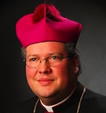
Prime Bishop Anthony Mikovsky
Lord, Teach Us to Pray
As we continue during this Ordinary Time season within the Church, we encounter a period when we are focused on the teachings of our Lord. This year as we primarily read from the Gospel of Luke, the Gospel readings during Holy Mass are taken from the time period when Jesus and His disciples are journeying from Galilee to Jerusalem where they will celebrate the Passover and we also know that this journey will culminate with the Passion, Death and Resurrection of our Lord.
On the 17th Sunday in Ordinary Time, we see our Lord spending time in prayer as was His custom throughout the whole of the Gospel. When He had concluded, one disciple comes to ask Him a question: “[Jesus] was praying in a certain place, and after He had finished, one of His disciples said to Him, ‘Lord, teach us to pray, as John taught his disciples.’ He said to them, ‘When you pray, say: Father, hallowed be Your name, Your kingdom come. Give us each day our daily bread. And forgive us our sins, for we too forgive all who do us wrong. And subject us not to the trial.’” (Luke 11:1-4)
It is important for us to take some time to reflect on this prayer and more importantly to reflect on the action of prayer within our lives. It certainly makes sense that the disciples would want to be able to pray as Jesus did. They had seen the mighty acts of power, the signs performed by our Lord and more importantly they had witnessed the close connection that He had with the Father. They sought to have this connection as well and so asked Jesus how to foster this relationship. They sought how to pray.
As we reflect on this version of our Lord’s Prayer, we also notice that it is not the one that we are used to praying. The one that is more familiar to us comes from the Gospel of Matthew, and even more so from the King James’ Version of the Gospel of Matthew. These words have, in fact, become so familiar to us that when the language of the liturgy was entirely updated to speak more faithfully and naturally to us in the vernacular, the words of the “Our Father” were left unchanged because they have become so well known within our world. As we read the version from the Gospel of Luke on the 17th Sunday in Ordinary Time, we reflected on a different telling of these same thoughts and we were reminded that the Lord was not giving us a formula to recite when we approach God in moments of prayer. Jesus was rather showing to us a way in which we should approach our ongoing relationship with Almighty God.
We begin by addressing God as “Father.” This immediately speaks to the relationship that we seek to have with God. We certainly recognize God as the sovereign Lord and the Creator of all, but even with that knowledge, we address God as Father. This immediately implies that we recognize the love and care that God has for His people. He is not only the One Who created us, and rules over us, but also that He cares for us and loves us as His beloved children.
We next pray, “Hallowed be Your name, Your kingdom come.” This portion of the prayer begins with the recognition that even though we address God as “Father” we acknowledge that He is the blessed one, the Lord, the Creator. In recognizing this reality of Almighty God, we show that He, and His name, are to be honored and adored. We then continue by acknowledging that His way, for us and for our world, is the way that we should desire to live within our own individual lives, our communal lives and also within our world. Although we say, “Your kingdom come,” we must recognize that we are speaking here in active words. We desire that God’s reign, God’s will, becomes a reality for us. This means that we will seek to live our own lives according to the teachings of Almighty God; that we will be guided by the commandments, that we will allow the Word of God, shown to us most fully in the teachings of Christ, to guide our daily steps. We will also seek to discern the ways of God as we gather together within our parish churches and within our entire Polish National Catholic Church. We will also seek to have the reign of Almighty God become a part of the life of our world in how we live each and every day.
The prayer then turns to the concerns of our daily living. We pray, “Give us each day our daily bread.” While this petition certainly includes the food that sustains us each day of our lives, we must also realize that in general we are speaking here of all the things that we require within our lives. This petition does not seek to fulfill all of the selfish wants and desires of each of our lives, but rather seeks to fulfill what is needed to continue to live and serve our Lord and each other each day. It is also important to notice that we do not ask for general abundance for what is needed, but rather ask for our ‘bread’ for ‘each day.’ In this we are encouraged to seek to have and to sustain a daily connection with Almighty God. We should desire to have an ongoing relationship with God that we will daily pray and renew this connection.
Following this petition, we then pray, “Forgive us our sins for we too forgive all who do us wrong.” We see within these words the connection between our relationship with Almighty God and our relationship with one another. We must recognize that each one of us is a beloved child of God. We must recognize that each and every one of us can reach out to God as our beloved Father. Therefore we must, then, seek to recognize that we are brothers and sisters in Christ; we are one family in God. If then we are one family, we must seek to be united in faith, hope and love. We must be united in our life of prayer, in our life of service to God and each other, and in each and every aspect of our daily living.
We conclude the prayer with the words, “Subject us not to the trial.” These words are often confusing to us because we know that God does not desire that any of us be subjected to trials. Rather these words show us that when we do face any times of trial within our lives, that God is on our side in coming through these trials. He does not “subject us” to trials, but rather God ‘accompanies us’ through all that we encounter within our daily living.
As we have now examined the prayer of Jesus as given in the Gospel of Luke, I encourage each and every one of us to spend some time in reflecting on the words of the “Our Father” as we spend our moments in prayer throughout our day. It often becomes so easy for us to just go through the words without even a moment of thought as we recite them. Jesus addresses this very situation, right before giving the “Our Father” within the Gospel of Matthew, when He tells us: “When you are praying, do not heap up empty phrases as the Gentiles do; for they think that they will be heard because of their many words.” (Matthew 6:7) Encountering these thoughts from the Gospel of St. Luke reminds us that God does not desire that we just pray mindlessly. Rather God seeks to have a loving relationship with each and every one of us. We know that we are His beloved children, therefore we, too, should seek to have a relationship with our heavenly Father.
As we pray the “Our Father” as a part of our daily life of prayer, let’s take a few moments to acknowledge the words that we pray. Let’s pray them with intention and a sincere desire to allow God to bring them to reality in our lives. And then let us also expand our prayer, to a real relationship with God in our lives. Let us reach out to God, not only within our times of daily prayer in the morning and evening, but at each and every moment of our day. Let us seek His blessing as we begin every work, both those that are within the Church and also those more mundane actions of our daily living. Let us seek His blessing each day, as we go off to work, or any other activity. Let us seek His blessing upon every word that comes forth from our mouths. In short, let us seek His blessing upon everything. Then we will begin to fulfill the words of St. Paul to the Thessalonians: “See that none of you repays evil for evil, but always seek to do good to one another and to all. Rejoice always, pray without ceasing.” (1 Thessalonians 5:15-16)

